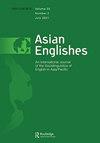单语借款人:调和英语在日本的成功与失败
IF 1.8
Q1 LINGUISTICS
引用次数: 1
摘要
摘要本文论述了日本作为一个孤立的单语国家对英语的理想化和崇拜。自19世纪中期以来,英语一直是日本的一门强制性外语;今天,英语被认为是学校最重要的科目之一。然而,大多数日本人对自己的英语学习经历感到焦虑。尽管已经学了很多年英语,但普通人生活在无法使用英语的困境中。这种困境的一个明显副产品是日常日语中英语借词的大量使用。矛盾的是,这些外来词在日语语境中往往会发生超出原意的词汇变化,直到母语为英语的人无法理解它们的含义。本文讨论了英语教育失败的假设原因,以及(2)日本人喜欢使用英语外来词(日本圣公会)而不是说英语。本文章由计算机程序翻译,如有差异,请以英文原文为准。
The monolingual borrowers: reconciling the success and failure of English in Japan
ABSTRACT This article discusses Japan’s idealization and adoration of English language while at the same time being an insular monolingual nation. English has been an imperative foreign language in Japan from the mid-1800s; today, English is regarded as one of the most important school subjects . However, most Japanese people hold anxiety about their English learning experiences. The average person lives with a dilemma of not being able to use English despite having learned it for many years. One noticeable by-product of the dilemma is rampant use of English loanwords in everyday Japanese language. Paradoxically, such loanwords tend to undergo lexical shifts in Japanese contexts beyond original meanings until native English speaers are unable to comprehend their meanings. This paper discusses the hypothetical reasons why English education stays unsuccessful, and (2) Japanese people love to rely on use of English loanwords (Japanese Anglicism) instead of speaking English.
求助全文
通过发布文献求助,成功后即可免费获取论文全文。
去求助
来源期刊

Asian Englishes
LINGUISTICS-
CiteScore
3.30
自引率
18.80%
发文量
34
期刊介绍:
Asian Englishes seeks to publish the best papers dealing with various issues involved in the diffusion of English and its diversification in Asia and the Pacific. It aims to promote better understanding of the nature of English and the role which it plays in the linguistic repertoire of those who live and work in Asia, both intra- and internationally, and in spoken and written form. The journal particularly highlights such themes as: 1.Varieties of English in Asia – Including their divergence & convergence (phonetics, phonology, prosody, vocabulary, syntax, semantics, pragmatics, discourse, rhetoric) 2.ELT and English proficiency testing vis-a-vis English variation and international use of English 3.English as a language of international and intercultural communication in Asia 4.English-language journalism, literature, and other media 5.Social roles and functions of English in Asian countries 6.Multicultural English and mutual intelligibility 7.Language policy and language planning 8.Impact of English on other Asian languages 9.English-knowing bi- and multilingualism 10.English-medium education 11.Relevance of new paradigms, such as English as a Lingua Franca, to Asian contexts. 12.The depth of penetration, use in various domains, and future direction of English in (the development of) Asian Societies.
 求助内容:
求助内容: 应助结果提醒方式:
应助结果提醒方式:


